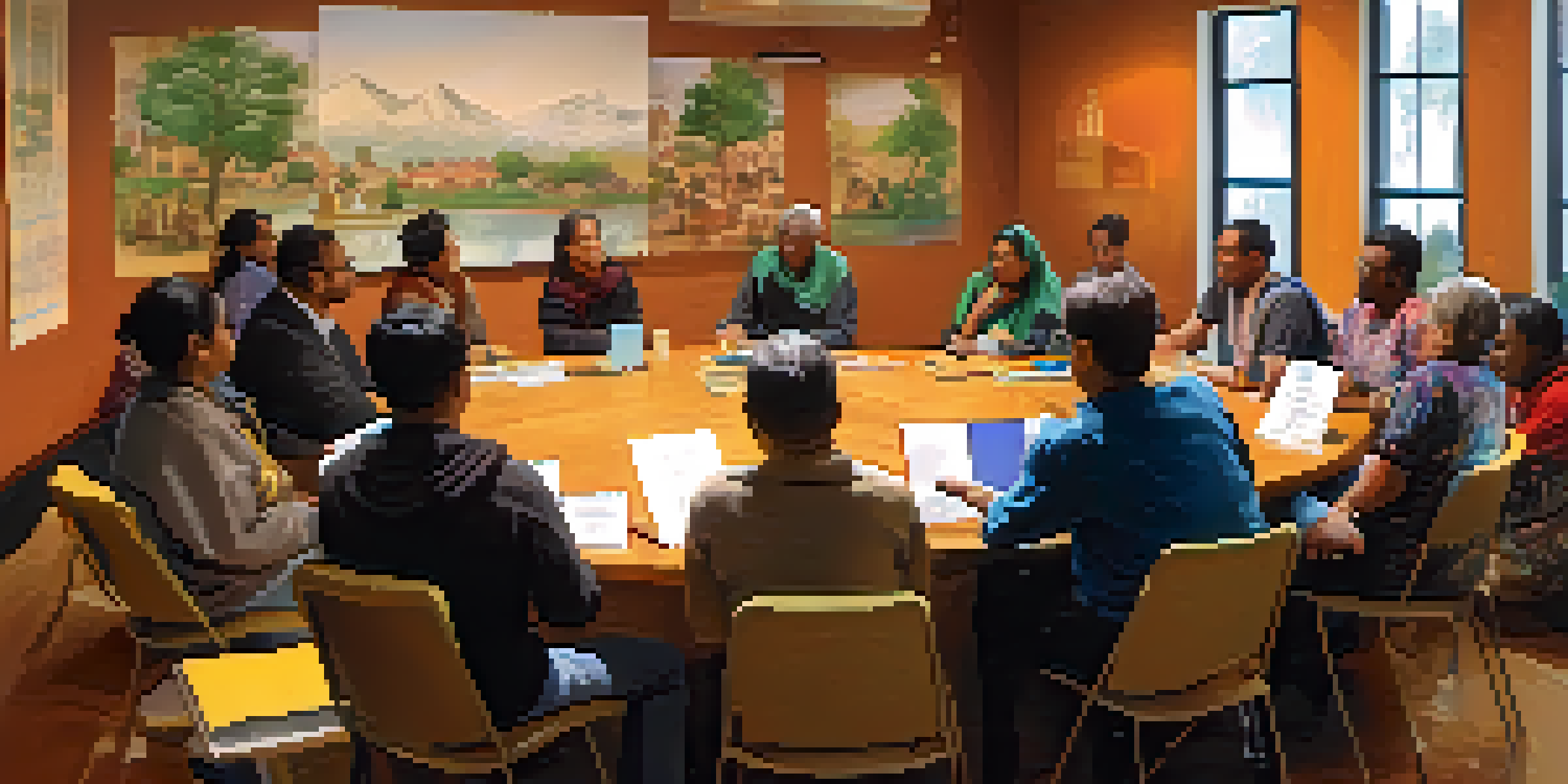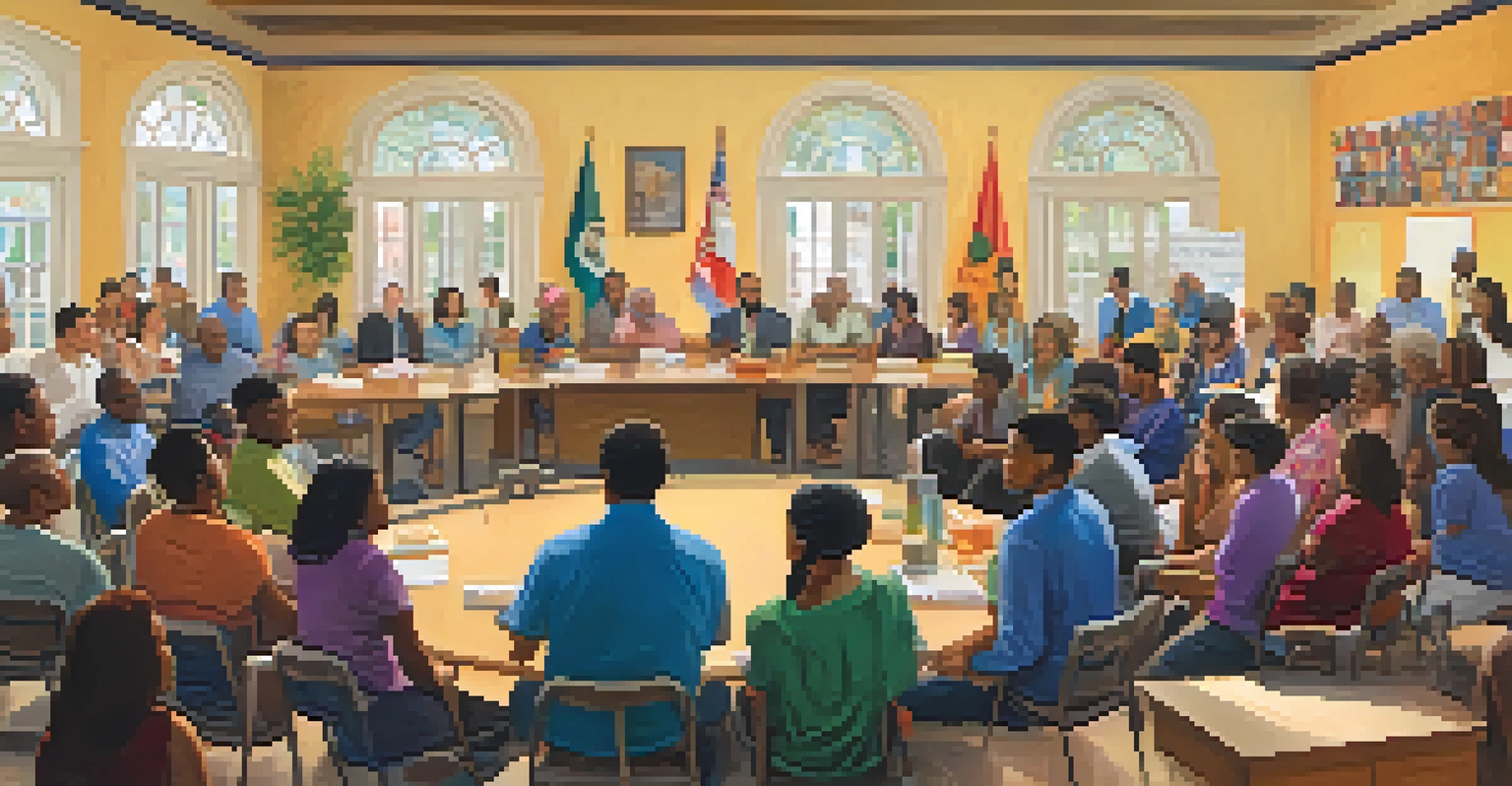The Importance of Civic Engagement in Missouri Politics

What is Civic Engagement and Why Does It Matter?
Civic engagement refers to the active participation of citizens in their communities and governance. This can include voting, attending town hall meetings, or volunteering for local organizations. In Missouri, where local issues often directly impact daily life, civic engagement plays a vital role in shaping policies that reflect the community's needs.
The future depends on what you do today.
When citizens engage, they voice their concerns and advocate for change, ensuring that their perspectives are considered in decision-making processes. This collective action fosters a sense of community and encourages others to participate, creating a ripple effect that strengthens democracy. Essentially, civic engagement transforms individuals from passive observers into active contributors to their government.
Moreover, engaged citizens are more likely to stay informed about local and state issues, leading to a more educated electorate. This knowledge can empower voters to make choices that align with their values and priorities, significantly influencing the political landscape in Missouri.
The Impact of Voting in Missouri's Democracy
Voting is perhaps the most direct form of civic engagement, and in Missouri, it carries significant weight. Every election cycle, citizens have the opportunity to influence local, state, and national policies through their votes. Participation in elections ensures that diverse voices are heard and represented, reflecting the state's rich tapestry of demographics and opinions.

However, voter turnout can vary widely, often depending on factors like age, socioeconomic status, and education. Efforts to increase voter registration and participation—such as community outreach programs—can enhance democracy by ensuring that all voices contribute to the electoral process. This collective involvement can lead to the election of candidates who truly represent the interests of Missouri citizens.
Civic Engagement Empowers Communities
Active participation in local governance allows citizens to voice concerns and advocate for change, enhancing community well-being.
In a state where local government decisions can drastically affect residents’ lives, every vote counts. Engaged voters can hold elected officials accountable, pushing for policies that address pressing community issues, from education to healthcare and beyond.
Grassroots Movements: A Catalyst for Change
Grassroots movements are a powerful form of civic engagement that can drive significant political change. In Missouri, many local issues have sparked grassroots campaigns that rally community members around shared goals. For instance, movements advocating for environmental protection or social justice often emerge from passionate citizens who recognize the need for change in their neighborhoods.
Civic engagement is not just about voting; it's about making your voice heard in every way possible.
These movements not only raise awareness but also mobilize people to take action—whether by organizing protests, lobbying for legislation, or engaging in community education. The collective power of grassroots activism can lead to tangible outcomes, such as policy reforms or shifts in public opinion, demonstrating the strength of organized civic engagement.
Moreover, grassroots movements can inspire future generations to become involved in their communities. When people see the impact of their collective efforts, they are more likely to continue participating in civic activities, creating a legacy of engagement that benefits the political landscape for years to come.
The Role of Local Organizations in Civic Engagement
Local organizations play a crucial role in fostering civic engagement by providing resources and opportunities for participation. In Missouri, community groups often host workshops, forums, and events that educate residents about local issues and encourage them to get involved. These organizations serve as hubs for activism, connecting individuals with shared interests and goals.
By facilitating discussions and providing platforms for expression, local organizations empower citizens to take ownership of their communities. They can help individuals navigate the complexities of political processes, from understanding how to vote to advocating for specific policies. This support is vital in demystifying governance and making it accessible to everyone.
Voting Shapes Missouri's Future
Every election presents an opportunity for citizens to influence policies, making voter participation crucial for democracy.
Furthermore, these organizations often collaborate with schools, businesses, and government agencies to promote civic engagement initiatives. By building partnerships within the community, they can amplify their impact, reaching a broader audience and inspiring more citizens to participate in the political process.
Youth Engagement: Shaping the Future of Missouri Politics
Engaging young people in civic activities is essential for the future of Missouri's political landscape. As the next generation of voters, youth involvement can lead to a shift in priorities and policies that reflect their values. Initiatives aimed at increasing youth participation—such as school programs and social media campaigns—are vital for cultivating a politically active generation.
When young people engage in civic activities, they not only learn about the political process but also develop a sense of responsibility towards their communities. Participating in discussions, volunteering, or advocating for causes they care about can instill lifelong habits of engagement. This early involvement can lead to higher voter turnout and sustained activism as they transition into adulthood.
Moreover, youth engagement brings fresh perspectives to the political discourse. Young people often champion progressive issues like climate change and social justice, pushing for innovative solutions that resonate with their peers. Their voices can challenge the status quo and inspire elected officials to consider the needs of younger constituents.
The Importance of Communication in Civic Engagement
Effective communication is at the heart of successful civic engagement. In Missouri, clear dialogue between citizens, community leaders, and government officials is essential for addressing local issues. Open lines of communication foster trust and collaboration, enabling communities to work together towards common goals.
Social media and digital platforms have transformed how citizens engage with politics, allowing for real-time discussions and mobilization. Campaigns that utilize these tools can reach a broader audience, encouraging more people to participate in civic activities. However, it's crucial to ensure that information shared is accurate and constructive to maintain a positive discourse.
Youth Engagement Drives Change
Involving young people in civic activities fosters a sense of responsibility and brings fresh perspectives to political discourse.
Furthermore, encouraging diverse voices in these conversations enriches the dialogue. When individuals from various backgrounds share their experiences and perspectives, it leads to a more comprehensive understanding of the challenges facing the community. This inclusivity can drive more effective solutions and foster a deeper sense of belonging among citizens.
Civic Engagement as a Tool for Accountability
Civic engagement serves as a powerful tool for holding elected officials accountable. In Missouri, when citizens actively participate in local governance, they can demand transparency and responsiveness from their leaders. This accountability is crucial for ensuring that officials act in the best interests of their constituents, rather than pursuing personal or partisan agendas.
Regular participation in town hall meetings, community forums, and public consultations allows citizens to voice their concerns and question decisions made by their representatives. This form of direct engagement can deter misconduct and encourage officials to prioritize the needs of their communities. It also sends a clear message that citizens are watching and willing to take action.

Moreover, when citizens mobilize around specific issues, they can create pressure that compels change. Whether it’s through petitions, demonstrations, or organized campaigns, engaged citizens can influence policy decisions and drive reforms. This dynamic underscores the importance of civic engagement as a cornerstone of a healthy democracy.